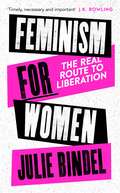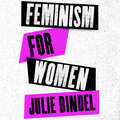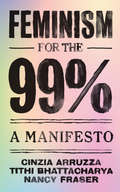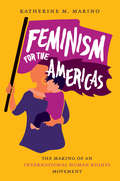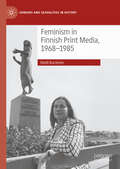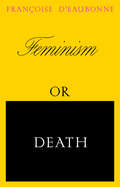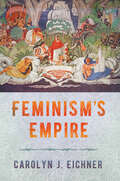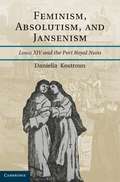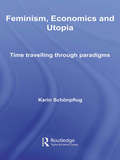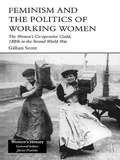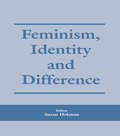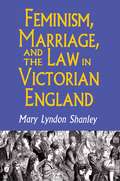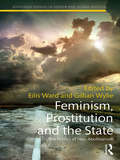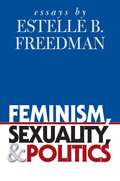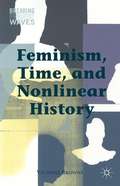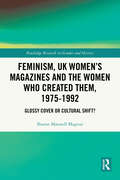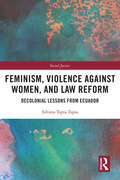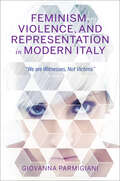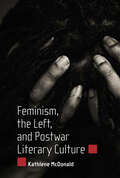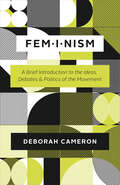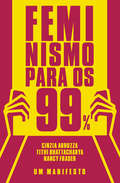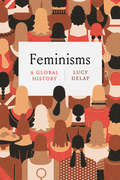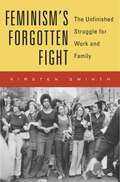- Table View
- List View
Feminism for Women: The Real Route to Liberation
by Julie Bindel'Timely, necessary and important' J.K. Rowling'[This book is] guaranteed to remind us what we have still to fight for. I can't think of a single person who wouldn't benefit from reading it' ObserverFeminism is a quest for the liberation of women from patriarchy. Feminism strives for a world in which women are not oppressed. Feminism prioritises exposing and ending male violence towards women and girls.This is Julie Bindel's feminism, a definition born of 40 years at the front line of the feminist movement. Why then, she asks, is feminism the only social justice movement in the world that is expected to prioritise every other issue before pursuing its own objective of women's liberation? Why does the movement appear to be moving backwards, accommodating the rights and feelings of men and leaving women in the cold? Women make up half the global population yet why is feminism still treated as a minority movement?In this searing and ground-breaking book, Bindel deconstructs the many pervasive myths about feminism - Do women really want what men have? Can men be feminists? Are women liberated by sexual violation? - assessing whether feminism has achieved its goals and debunking theories that second wave feminism is irrelevant and one-dimensional.Bindel shines a light on the most important issues, including pornography, sexual violence and prostitution. Drawing on Bindel's own experiences, as well as countless interviews with women and girls of all ages and backgrounds (as well as contributions from commentators such as Gloria Steinem and Chimamanda Ngozi Adichie), Feminism for Women presents a clear-sighted view of why feminism is a proud social movement that every woman on the planet benefits from.The invisible forces of misogyny affect us all.This book is a call to arms to reclaim feminism for all women.Only together can we resist and overcome.
Feminism for Women: The Real Route to Liberation
by Julie Bindel'Timely, necessary and important' J.K. Rowling'[This book is] guaranteed to remind us what we have still to fight for. I can't think of a single person who wouldn't benefit from reading it' Observer'Bindel is a rock star of second-wave feminism . . . an important, courageous book' The Times'Bindel delivers a robust call to arms in every chapter . . . this book could not be timelier . . . As a young feminist who has finally seen the light, I consider it essential reading' The CriticFeminism is a quest for the liberation of women from patriarchy. Feminism strives for a world in which women are not oppressed. Feminism prioritises exposing and ending male violence towards women and girls.This is Julie Bindel's feminism, a definition born of 40 years at the front line of the feminist movement. Why then, she asks, is feminism the only social justice movement in the world that is expected to prioritise every other issue before pursuing its own objective of women's liberation? Why does the movement appear to be moving backwards, accommodating the rights and feelings of men and leaving women in the cold? Women make up half the global population yet why is feminism still treated as a minority movement?In this searing and ground-breaking book, Bindel deconstructs the many pervasive myths about feminism - Do women really want what men have? Can men be feminists? Are women liberated by sexual violation? - assessing whether feminism has achieved its goals and debunking theories that second wave feminism is irrelevant and one-dimensional.Bindel shines a light on the most important issues, including pornography, sexual violence and prostitution. Drawing on Bindel's own experiences, as well as countless interviews with women and girls of all ages and backgrounds (as well as contributions from commentators such as Gloria Steinem and Chimamanda Ngozi Adichie), Feminism for Women presents a clear-sighted view of why feminism is a proud social movement that every woman on the planet benefits from.The invisible forces of misogyny affect us all.This book is a call to arms to reclaim feminism for all women.Only together can we resist and overcome.
Feminism for Women: The Real Route to Liberation
by Julie Bindel'Timely, necessary and important' J.K. Rowling'[This book is] guaranteed to remind us what we have still to fight for. I can't think of a single person who wouldn't benefit from reading it' Observer'Bindel is a rock star of second-wave feminism . . . an important, courageous book' The Times'Bindel delivers a robust call to arms in every chapter . . . this book could not be timelier . . . As a young feminist who has finally seen the light, I consider it essential reading' The CriticFeminism is a quest for the liberation of women from patriarchy. Feminism strives for a world in which women are not oppressed. Feminism prioritises exposing and ending male violence towards women and girls.This is Julie Bindel's feminism, a definition born of 40 years at the front line of the feminist movement. Why then, she asks, is feminism the only social justice movement in the world that is expected to prioritise every other issue before pursuing its own objective of women's liberation? Why does the movement appear to be moving backwards, accommodating the rights and feelings of men and leaving women in the cold? Women make up half the global population yet why is feminism still treated as a minority movement?In this searing and ground-breaking book, Bindel deconstructs the many pervasive myths about feminism - Do women really want what men have? Can men be feminists? Are women liberated by sexual violation? - assessing whether feminism has achieved its goals and debunking theories that second wave feminism is irrelevant and one-dimensional.Bindel shines a light on the most important issues, including pornography, sexual violence and prostitution. Drawing on Bindel's own experiences, as well as countless interviews with women and girls of all ages and backgrounds (as well as contributions from commentators such as Gloria Steinem and Chimamanda Ngozi Adichie), Feminism for Women presents a clear-sighted view of why feminism is a proud social movement that every woman on the planet benefits from.The invisible forces of misogyny affect us all. This book is a call to arms to reclaim feminism for all women. Only together can we resist and overcome.
Feminism for the 99%: A Manifesto
by Nancy Fraser Cinzia Arruzza Tithi BhattacharyaNamed one of Vogue’s “Most Anticipated Books of 2019” <P><P>This is a manifesto for the 99 percent <P><P>Unaffordable housing, poverty wages, inadequate healthcare, border policing, climate change—these are not what you ordinarily hear feminists talking about. But aren’t they the biggest issues for the vast majority of women around the globe? <P><P>Taking as its inspiration the new wave of feminist militancy that has erupted globally, this manifesto makes a simple but powerful case: feminism shouldn’t start—or stop—with the drive to have women represented at the top of their professions. It must focus on those at the bottom, and fight for the world they deserve. And that means targeting capitalism. Feminism must be anticapitalist, eco-socialist and antiracist.
Feminism for the Americas: The Making of an International Human Rights Movement (Gender and American Culture)
by Katherine M. MarinoThis book chronicles the dawn of the global movement for women's rights in the first decades of the twentieth century. The founding mothers of this movement were not based primarily in the United States, however, or in Europe. Instead, Katherine M. Marino introduces readers to a cast of remarkable Latin American and Caribbean women whose deep friendships and intense rivalries forged global feminism out of an era of imperialism, racism, and fascism. Six dynamic activists form the heart of this story: from Brazil, Bertha Lutz; from Cuba, Ofelia Domingez Navarro; from Uruguay, Paulina Luisi; from Panama, Clara Gonzalez; from Chile, Marta Vergara; and from the United States, Doris Stevens. This Pan-American network drove a transnational movement that advocated women's suffrage, equal pay for equal work, maternity rights, and broader self-determination. Their painstaking efforts led to the enshrinement of women's rights in the United Nations Charter and the development of a framework for international human rights. But their work also revealed deep divides, with Latin American activists overcoming U.S. presumptions to feminist superiority. As Marino shows, these early fractures continue to influence divisions among today's activists along class, racial, and national lines. Marino's multinational and multilingual research yields a new narrative for the creation of global feminism. The leading women introduced here were forerunners in understanding the power relations at the heart of international affairs. Their drive to enshrine fundamental rights for women, children, and all people of the world stands as a testament to what can be accomplished when global thinking meets local action.
Feminism in Finnish Print Media, 1968-1985 (Genders and Sexualities in History)
by Heidi KurvinenThis book focuses on the discussion of the women’s liberation movement and feminism in Finnish print media between 1968 and 1985. By analysing this topic, the book demonstrates that a relatively well-developed state of gender equality in a society does not necessarily result in fertile ground for feminist activism. On the contrary, it may hinder the success of more radical claims presented by feminists, and mass media serves as a central player in this. Consequently, the book enhances our understanding of the mechanisms that prevent societies from reaching complete equality, and it shows how cultural specificities influence the ways in which transnational ideas of feminism are adopted in a local context. This is shown by analysing the dialogic relationship between journalists and feminist activists as well as the mediated negotiations of the meanings of feminism within the women’s movement.
Feminism or Death: How the Women's Movement Can Save the Planet
by Francoise d'EaubonneThe passionately argued, incendiary French feminist work that first defined &“eco-feminism&”—now available for the first time in English Originally published in French in 1974, radical feminist Francoise d&’Eaubonne surveyed women&’s status around the globe and argued that the stakes of feminist struggle was not about equality but about life and death—for humans and the planet. In this wide-ranging manifesto, d&’Eaubonne first proposed a politics of ecofeminism, the idea that the patriarchal system's claim over women's bodies and the natural world destroys both, and that feminism and environmentalism must bring about a new &“mutation&”—an overthrow of not just male power but the system of power itself. As d&’Eaubonne prophesied, &“the planet placed in the feminine will flourish for all.&” Never before published in English, and translated here by French feminist scholar Ruth Hottell, this edition includes an introduction from scholars of ecology and feminism situating d&’Eaubonne&’s work within current feminist theory, environmental justice organizing, and anticolonial feminism.
Feminism's Empire
by Carolyn J. EichnerFeminism's Empire investigates the complex relationships between imperialisms and feminisms in the late nineteenth century and demonstrates the challenge of conceptualizing "pro-imperialist" and "anti-imperialist" as binary positions. By intellectually and spatially tracing the era's first French feminists' engagement with empire, Carolyn J. Eichner explores how feminists opposed—yet employed—approaches to empire in writing, speaking, and publishing. In differing ways, they ultimately tied forms of imperialism to gender liberation. Among the era's first anti-imperialists, French feminists were enmeshed in the hierarchies and epistemologies of empire. They likened their gender-based marginalization to imperialist oppressions. Imperialism and colonialism's gendered and sexualized racial hierarchies established categories of inclusion and exclusion that rested in both universalism and ideas of "nature" that presented colonized people with theoretical, yet impossible, paths to integration. Feminists faced similar barriers to full incorporation due to the gendered contradictions inherent in universalism. The system presumed citizenship to be male and thus positioned women as outsiders. Feminism's Empire connects this critical struggle to hierarchical power shifts in racial and national status that created uneasy linkages between French feminists and imperial authorities.
Feminism, Absolutism, and Jansenism
by Daniella KostrounFeminism, Absolutism, and Jansenism chronicles seventy years of Jansenist conflict and its complex intersection with power struggles between gallican bishops, Parlementaires, the Crown and the Pope. Daniella Kostroun focuses on the nuns of Port-Royal-des-Champs, whose community was disbanded by Louis XIV in 1709 as a threat to the state. Paradoxically, it was the nuns' adherence to their strict religious rule and the ideal of pious, innocent and politically disinterested behavior that allowed them to challenge absolutism effectively. Adopting methods from cultural studies, feminism and the Cambridge School of political thought, Kostroun examines how these nuns placed gender at the heart of the Jansenist challenge to the patriarchal and religious foundations of absolutism; they responded to royal persecution with a feminist defense of women's spiritual and rational equality and of the autonomy of the individual subject, thereby offering a bold challenge to the patriarchal and religious foundations of absolutism.
Feminism, Economics and Utopia: Time Travelling through Paradigms (Routledge Frontiers Of Political Economy Ser.)
by Karin SchonpflugAre there feminist, economic utopian visions amongst feminist economists? What are these visions? Is there a common vision for feminist economics or should there be? Can feminist economics be effective without a utopian vision?Comprehensive and original, this book surveys the entire field of utopian literature; from Plato to the present. Answering
Feminism, Femininity and the Politics of Working Women: The Women's Co-Operative Guild, 1880s to the Second World War (Women's History Ser.)
by Gillian ScottBased on extensive research, this text provides a critical investigation of the development of the Women's Co-operative Guild from the 1880s to World War II. Charting the rise and fall of an exceptional feminist political organization, the author assesses the political significance of the movement during the decades of its greatest influence and examines the causes and circumstances of its demise. Advancing a fresh perspective on working-class women's organizations, this book combines historical narrative, biography and political analysis.
Feminism, Identity and Difference
by Susan HekmanThis study focuses on a set of issues at the forefront of feminist thought in the late 1990s: identity, difference and their implications for feminist politics. As feminism moves into an era in which differences among women, the multiple identities of woman and identity politics are all at the centre of feminist discussions, new approaches, methods and politics are called for.
Feminism, Marriage, and the Law in Victorian England, 1850-1895
by Mary Lyndon ShanleyBridging the fields of political theory and history, this comprehensive study of Victorian reforms in marriage law reshapes our understanding of the feminist movement of that period. As Mary Shanley shows, Victorian feminists argued that justice for women would not follow from public rights alone, but required a fundamental transformation of the marriage relationship.
Feminism, Prostitution and the State: The Politics of Neo-Abolitionism (Routledge Studies in Gender and Global Politics)
by Gillian Wylie Eilis WardThis edited volume focuses on charting the rise of neo-abolitionism and offering a critique of the idea, its logics and consequences. A model of state policy which aims to abolish prostitution through legislation, Neo-abolitionism criminalises the buyer of sex but not the seller. It is currently law in Sweden and other Nordic states and dominates the framing of policy debates in many other Western liberal contexts. Pressure for adoption of this policy has come from radical feminists who understand prostitution and sex trafficking as a form of violence against women. This volume argues that this convergence between radical feminism and state’s interests arises from the emergence of, on the one hand, ‘governance feminism’ which seeks to have its ideals implemented through ‘top-down sovereigntist means’, and on the other hand, state’s interests in legitimising stricter border controls and law enforcement responses in relation to transnational organised criminality, ‘illegal’ migration, and security. Based around a series of country case studies each chapter will explore the politics surrounding the emergence of neo-abolitionism and its trajectory through those polities, whether the paradigm has been adopted, rejected or is still under debate. The volume will be of great interest to students and scholars of Social and Public Policy, Gender and Women’s Studies, Politics and International Relations and Critical Legal Studies/Criminology.
Feminism, Sexuality, and Politics
by Estelle B. FreedmanOne of a small group of feminist pioneers in the historical profession, Estelle B. Freedman teaches and writes about women's history with a passion informed by her feminist values. Over the past thirty years, she has produced a body of work in which scholarship and politics have never been mutually exclusive. This collection brings together eleven essays--eight previously published and three new--that document the evolving relationship between academic feminism and political feminism as Freedman has studied and lived it.Following an introduction that presents a map of the personal and intellectual trajectory of Freedman's work, the first section of essays, on the origins and strategies of women's activism in U.S. history, reiterates the importance of valuing women in a society that has long devalued their contributions. The second section, on the maintenance of sexual boundaries, explores the malleability of both sexual identities and sexual politics. Underlying the collection is an inquiry into the changing meanings of gender, sexuality, and politics during the nineteenth and twentieth centuries along with a concern for applying the insights of women's history broadly, from the classroom to the courthouse.
Feminism, Time, and Nonlinear History
by Victoria BrowneInterweaving phenomenological, hermeneutical, and sociopolitical analyses, this book considers the ways in which feminists conceptualize and produce the temporalities of feminism, including the time of the trace, narrative time, calendar time, and generational time.
Feminism, UK Women’s Magazines and the Women who Created Them, 1975-1992: Glossy Cover or Cultural Shift? (Routledge Research in Gender and History)
by Sharon Maxwell MagnusThis book analyses how reproductive rights and sexual freedoms, the political sphere, women’s role in the workplace and sexual violence were positioned and depicted by three magazines with very different demographics: Spare Rib, Cosmopolitan and Woman’s Own. The 1970s and 1980s were a time of enormous cultural shifts for women: The rise of the feminist Women’s Liberation Movement, ground-breaking equality legislation and greater reproductive freedoms impacted on most women’s lives in a plethora of ways. However, until now there has been little attention to how those changes were disseminated to and framed within women’s media. This is because most media of the period were run by men, for men and focused on men’s lives. However, within women’s magazines, the changes in women’s lives and feminism itself were framed, debated and contested. This volume features unique interviews with the influential women who produced the magazines (Spare Rib, Cosmopolitan and Woman’s Own) and who give insights into the national and international events, ideologies and constraints which impacted on their content creation.This book will be of great value to contemporary historians, students of gender and cultural studies, media scholars and those who are interested in finding out how feminism influenced their parents’ and their own generation.
Feminism, Violence Against Women, and Law Reform: Decolonial Lessons from Ecuador (Social Justice)
by Silvana Tapia TapiaOffering an important addition to existing critiques of governance feminism and carceral expansion based mainly on experiences from the Global North, this book critically addresses feminist law reform on violence against women, from a decolonial perspective. Challenging the consensus that penal expansion is mainly associated with the co-option of feminist campaigns to counteract violence against women in the context of neoliberal globalisation, this book shows that long-standing colonial narratives underlie many of today’s dominant legal discourses justifying criminalisation, even in countries whose governments have called themselves "leftist" and "post-neoliberal". Mapping the history of law reform on violence against women in Ecuador, the book reveals how the conciliation between feminist campaigns and criminalisation strategies takes place through liberal legality, the language of human rights, and the discourse of constitutional guarantees, across the political spectrum. Whilst human rights make violence against women intelligible in mainstream legal terms, the book shows that the emergence of a "rights-based penality" produces a benign, formally innocuous criminal law, which can be presented as progressive, but in practice reproduces colonial and postcolonial paradigms that limit and reshape feminist demands. The book raises new questions on the complex social and political factors that impact on feminist law reform projects, as it demonstrates how colonial assumptions about gender, race, class, and the family remain embedded in liberal criminal law. This theoretically and empirically informed analysis makes an innovative contribution to feminist legal theory, post-colonial studies, and criminal law; and will be of interest to activists, scholars and policymakers working at the intersections between gender equality, law, and violence in Latin America and beyond.
Feminism, Violence, and Representation in Modern Italy: "We are Witnesses, Not Victims" (New Anthropologies of Europe)
by Giovanna ParmigianiA study of how violence and language affect women in Italy.Can the way a word is used give legitimacy to a political movement? Feminism, Violence, and Representation in Modern Italy traces the use of the word “femminicidio” (or “femicide”) as a tool to mobilize Italian feminists, particularly the Union of Women in Italy (UDI). Based on nearly two years of fieldwork among feminist activists, Giovanna Parmigiani takes a broad look at the many ways in which violence inflects the lives of women in Italy. From unchallenged gendered grammar rules to the representation of women as victims, Parmigiani examines the devaluing of women’s contribution to their communities through the words and experiences of the women she interviews. She describes the first uses of the word “femminicidio” as a political term used by and within feminist circles and traces its spread to ultimate legitimization and national relevance. The word redefined women as a political subject by building an imagined community of potentially violated women. In doing so, it challenged Italians to consider the status of women in Italian society, and to make this status a matter of public debate. It also problematized the connection between women and tropes of women as objects of suffering and victimhood. Parmigiani considers this exchange within the context of Italian Catholic heritage, a precarious economy, and long-held notions of honor and shame. Parmigiani provides a careful and searing consideration of the ways in which representations of violence and the politics of this representation are shaping the future of women in Italy and beyond.
Feminism, the Left, and Postwar Literary Culture
by Kathlene McDonaldThis book traces the development of a Left feminist consciousness as women became more actively involved in the American Left during and immediately following World War II. McDonald argues that women writers on the Left drew on the rhetoric of antifascism to critique the cultural and ideological aspects of women's oppression. In Left journals during World War II, women writers outlined the dangers of fascist control for women and argued that the fight against fascism must also be about ending women's oppression. After World War II, women writers continued to use this antifascist framework to call attention to the ways in which the emerging domestic ideology in the United States bore a frightening resemblance to the fascist repression of women in Nazi Germany. This critique of American domestic ideology emphasized the ways in which black and working-class women were particularly affected and extended to an examination of women's roles in personal and romantic relationships. Underlying this critique was the belief that representations of women in American culture were part of the problem. To counter these dominant cultural images, women writers on the Left depicted female activists in contemporary antifascist and anticolonial struggles or turned to the past, for historical role models in the labor, abolitionist, and antisuffrage movements. This depiction of women as models of agency and liberation challenged some of the conventions about femininity in the postwar era. The book provides a historical overview of women writers who anticipated issues about women's oppression and the intersections of gender, race, and class that would become central tenants of feminist literary criticism and black feminist criticism in the 1970s and 1980s. It closely considers works by writers both well-known and obscure, including Lorraine Hansberry, Alice Childress, Martha Dodd, Sanora Babb, and Beth McHenry.
Feminism: A Brief Introduction to the Ideas, Debates & Politics of the Movement (Ideas In Profile Ser.)
by Deborah CameronCommunications academic Deborah Cameron explores the history and diversity of Feminism as an ideology and political movement.Beneath the nonstop cacophony of voices across social media, online forums, and news outlets lie the stubborn facts at the heart of the everyday struggles of women today: more than a third of single moms live in poverty; the United States sees more maternal deaths than anywhere else in the developed world; one in five women will be raped in her lifetime; and women still make eighty cents for every dollar earned by a man. Between these brutal statistics and the ill-informed, often contentious public debate stand millions of women who feel alienated, disaffected, or just plain worn out.In the era of #MeToo, Trump, and online harassment, innovative progressive feminist voices are more essential than ever. With this book, Deborah Cameron considers feminism from all sides—as an idea, as a theoretical approach, and as a political movement. Written in the succinct, sharp style that has made Cameron’s feminist linguistics blog so popular, this short book lays out past and present debates on seven key topics: domination, rights, work, femininity, sex, culture, and the future. Feminism emphasizes the diversity of feminist thought, including queer, women-of-color, and trans perspectives. Cameron’s clear and incisive account untangles the often confusing strands of one of history’s most important intellectual and political movements.Broad in scope but refreshingly concise, this book is perfect for anyone who needs a straightforward primer on the complex history of feminism, a nuanced explanation of key issues and debates, or strategic thinking about the questions facing activists today.
Feminismo Para os 99%
by Tithi Bhattacharya NANCY FRASER CINZIA ARRUZZA«Toda a gente (e não apenas mulheres) deveria comprar este livro.» Nomeado um dos «Livros mais aguardados de 2019» pela revista Vogue Da autoria das organizadoras da Marcha Internacional das Mulheres, um manifesto verdadeiramente feminista em defesa da vida e das vidas de todos nós. Habitação a preços incomportáveis, salários no limiar da sobrevivência, saúde privatizada, educação pública negligenciada, horários laborais exigentes, alterações climáticas com consequências catastróficas. A crise que vivemos hoje é transversal a toda a sociedade e os seus efeitos - políticos, sociais e ambientais - têm um impacto brutal e imediato na vida de 99% da população, com particular gravidade para as mulheres.No entanto, a actual agenda feminista, em vez de difundir medidas verdadeiramente emancipadoras para todas as mulheres, tem preferido concentrar-se na obtenção de maior representatividade das mulheres nos quadros das grandes empresas, reclamando ainda mais poder e vantagem para uma minoria elitista e acomodada. Para resolver uma crise global, não podemos deter-nos nos problemas de apenas 1% da população.É, por isso, urgente um novo feminismo. Este manifesto tem por objectivo resgatar o verdadeiro propósito das lutas feministas e orientá-las para uma reorganização total da sociedade que beneficie, de facto, a maioria da população.Porque as mulheres estão na linha da frente dos efeitos devastadores das alterações climáticas, da austeridade, da gentrificação, da exploração laboral, da exaustão de recursos, da financeirização e da privatização das infraestruturas sociais, este é um manifesto em defesa das vidas dos 99%: um manifesto feminista. Por uma sociedade que coloque as pessoas no topo da sua lista de prioridades, Feminismo para os 99% - um manifesto é uma leitura obrigatória na luta por um mundo melhor e mais justo. «Toda a gente (e não apenas mulheres) deveria comprar este livro.» Vogue
Feminisms: A Global History
by Lucy DelapFeminism’s origins have often been framed around a limited cast of mostly white and educated foremothers, but the truth is that feminism has been and continues to be a global movement. For centuries, women from all walks of life have been mobilizing for gender justice. As the last decade has reminded even the most powerful women, there is nothing “post-feminist” about our world. And there is much to be learned from the passion and protests of the past. Historian Lucy Delap looks to the global past to give us a usable history of the movement against gender injustice—one that can help clarify questions of feminist strategy, priority and focus in the contemporary moment. Rooted in recent innovative histories, the book incorporates alternative starting points and new thinkers, challenging the presumed priority of European feminists and ranging across a global terrain of revolutions, religions, empires and anti-colonial struggles. In Feminisms, we find familiar stories—of suffrage, of solidarity, of protest—yet there is no assumption that feminism looks the same in each place or time. Instead, Delap explores a central paradox: feminists have demanded inclusion but have persistently practiced their own exclusions. Some voices are heard and others are routinely muted. In amplifying the voices of figures at the grassroots level, Delap shows us how a rich relationship to the feminist past can help inform its future.
Feminisms: A Global History
by Lucy DelapFeminism’s origins have often been framed around a limited cast of mostly white and educated foremothers, but the truth is that feminism has been and continues to be a global movement. For centuries, women from all walks of life have been mobilizing for gender justice. As the last decade has reminded even the most powerful women, there is nothing “post-feminist” about our world. And there is much to be learned from the passion and protests of the past. Historian Lucy Delap looks to the global past to give us a usable history of the movement against gender injustice—one that can help clarify questions of feminist strategy, priority and focus in the contemporary moment. Rooted in recent innovative histories, the book incorporates alternative starting points and new thinkers, challenging the presumed priority of European feminists and ranging across a global terrain of revolutions, religions, empires and anti-colonial struggles. In Feminisms, we find familiar stories—of suffrage, of solidarity, of protest—yet there is no assumption that feminism looks the same in each place or time. Instead, Delap explores a central paradox: feminists have demanded inclusion but have persistently practiced their own exclusions. Some voices are heard and others are routinely muted. In amplifying the voices of figures at the grassroots level, Delap shows us how a rich relationship to the feminist past can help inform its future.
Feminism’s Forgotten Fight: The Unfinished Struggle for Work and Family
by Kirsten SwinthKirsten Swinth reconstructs the comprehensive vision of feminism’s second wave at a time when its principles are under renewed attack. In the struggle for equality at home and at work, it was not feminism that failed to deliver on the promise that women can have it all, but a society that balked at making the changes for which activists fought.
